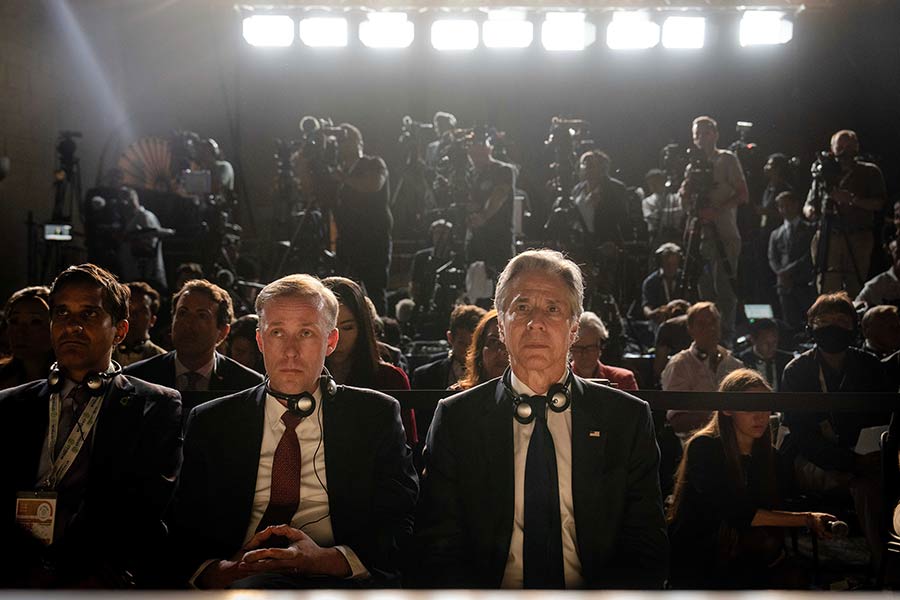Sharing the stage with President Volodymyr Zelenskyy of Ukraine at a seaside resort in Italy, President Joe Biden was looking forward to talking about a security pact he had just signed to provide continued support to Ukraine in its battle with Russia.
Having skipped a dinner to attend the ceremonial signing of the pact and to answer reporters’ questions, he seemed flustered when, after a few questions about Ukraine, he was asked about a topic that has been less rewarding recently: the Israel-Hamas war in the Gaza Strip.
“I wish you guys would play by the rules a little bit,” Biden snapped when asked for an update on the fate of a cease-fire deal in Gaza that he announced last month but has yet to be publicly accepted by Israel or Hamas. Biden reiterated the U.S. stance that the proposal had been endorsed by the Israeli government, the United Nations Security Council and the G7, and that the holdup was with Hamas.
“I’m here to talk about a critical situation in Ukraine,” Biden said. “You’re asking me another subject. I’ll be happy to answer it in detail later.”
The moment was emblematic of the shadow that U.S. support for Israel’s war in Gaza has cast over Biden’s efforts to restore the United States’ traditional role as a defender of democracy and a beacon of international law. In the U.S., Biden has met with protests across the country. And as he has rallied the world around Ukraine, he has grown increasingly isolated in his staunch support for Israel in its war against Hamas.
In recent weeks, the administration has urgently sought an end to the war in Gaza, which started after Hamas carried out an attack Oct. 7, killing 1,200 people and taking about 250 hostages, Israel says. Health authorities in Gaza say that more than 37,000 people there have perished so far, and humanitarian aid groups warn that hundreds of thousands are facing famine conditions.
In the weeks before he went on two back-to-back trips to Europe — the first to France last week to commemorate the 80th anniversary of D-Day — Biden shored up support among European allies by announcing the cease-fire deal, a three-phase-plan leading to a permanent cease-fire and Gaza’s reconstruction that he said was supported by Israel.
“It’s time for this war to end, for the day after to begin,” Biden said in a May 31 address at the White House.
The G7 endorsed the plan in the days after, saying it provided “a credible pathway towards peace leading to a two-state solution.” In the days before Biden traveled to the summit, the U.S. also sought and gained support for the plan from the Security Council — where the U.S. had repeatedly blocked earlier motions calling for a cease-fire.
But by the time he landed in Bari, Italy, for the G7 summit, neither Israel nor Hamas had publicly accepted the deal. And Israel, along with Hamas, was facing a new round of allegations of violating international law — one among several that the Biden administration has defended Israel against.
A United Nations commission found that both sides were responsible for killing civilians who had identified themselves as noncombatants. The report also highlighted the conflict’s heavy toll on children, not only those killed but also the large number orphaned.
The day the report was released, Biden’s national security adviser, Jake Sullivan, said the U.S. hadn’t read it; asked a second time, he referred to a U.S. assessment that found evidence that Israel had most likely violated international law, but not enough to withhold military aid.
“That’s the U.S. position with respect to these questions of international humanitarian law,” Sullivan said. “And I’ll let that speak for itself.”
But notably this week, Sullivan issued a statement condemning Russia for reports that it had separated Ukrainian children from their families, deported them and put them up for adoption. He called the allegations, which U.S. found credible, “despicable and appalling.”
In its final communiqué, issued Friday, G7 leaders called on Hamas and Israel to accept the deal laid out by Biden, and stated their “unwavering” commitment to a two-state solution.
They also went to some lengths to emphasize that both Hamas and Israel should follow international law.
“In exercising its right to defend itself, Israel must fully comply with its obligations under international law in all circumstances, including international humanitarian law,” the communiqué said. “We condemn Hamas for its continuing use of civilian infrastructure for its military activities and failure to separate and distinguish itself from civilians in Gaza
“We deplore all losses of civilian lives equally, and note with great concern the unacceptable number of civilian casualties especially women and children,” it said, adding that it called on “all parties to take every feasible step to protect civilian lives.”
The New York Times News Service










